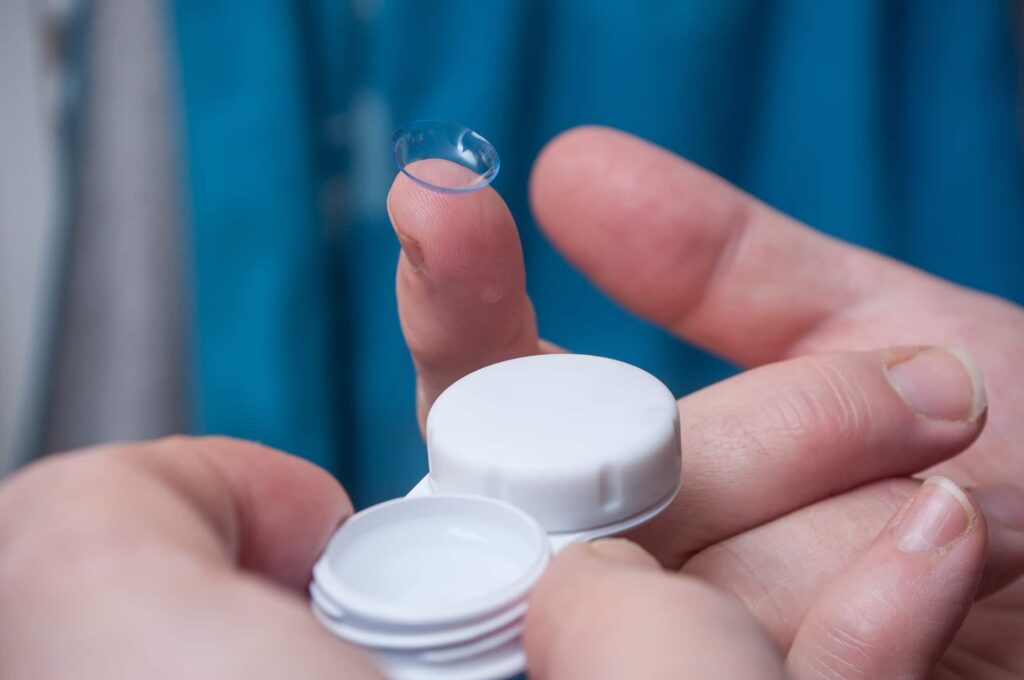
There are around 45 million people in America that wear contact lenses so overwearing is, unfortunately, a very common problem. Not following the appropriate instructions your eye doctor gives you can lead to higher chances of ocular health complications and even permanent visual impairment.
Sometimes you may not realize that you’re overwearing your contacts until you get your eyes checked.
Overwearing Contacts
Contacts are a fantastic option in addition to wearing glasses. However, if you don’t follow the proper hygiene rules, you can put your eye at risk for potentially serious, vision-threatening complications. First, you should always replace your contacts in the appropriate time frame based on the modality (daily, bi-weekly, monthly). This timer starts from when you open a new pair of lenses.
Regardless of how many hours you wore them (or how many days if it’s not a daily), after the specified time they should be replaced. Second, even if you replace them accordingly, having contacts doesn’t mean you shouldn’t wear your glasses.
Even with dailies, which are the most oxygen permeable, you can deprive your eye of oxygen if you wear them for long periods of time (15+ hours) every single day.
In the end, nothing beats having nothing on the eyes so it’s important to also wear your glasses to give your eyes a rest.
Symptoms of Overwear
There are multiple signs/symptoms of overwear. Some are noticeable with the naked eye, others can only be seen when observed by a professional with the appropriate ophthalmic equipment:
The symptoms are:
- Red eyes
When you overwear your contacts, or when you don’t follow the hygiene rules, you can irritate the sensitive tissue on the whites of the eye. This causes the natural blood vessels you have there to dilate causing the typical red-eye appearance. - Corneal Neovascularization
The cornea is the transparent part of your eye. While resilient, it is still sensitive and requires the appropriate amount of oxygen and nutrients to maintain its integrity. If you overwear contacts then you can deprive your cornea of oxygen. This will lead to blood vessels growing from the white part of the eye onto the cornea. This can only be seen by a trained eye doctor as the vessels are often small, but in extreme cases can also be quite extensive! - Dryness
Wearing your contacts for too long will cause them to dry out. This can make them feel as though they’re no longer fitting well in your eyes. Your eyes will feel uncomfortable and your vision may get blurry because the contacts and your ocular surface become more irregular when dry, and this affects the light entering your eye.
Overwearing contacts is never healthy for your eyes. This is why it’s always a good idea to wear your glasses to give your eyes a break!
Contact Lens Complication
We discussed some of the less offensive complications of contact lens overwear. When contact lens abuse is overdone, then we start risking more serious problems:
1. Allergies – overwearing your contacts can lead to your eyes developing an immune response to the irritation caused by the contacts. This can lead to the formation of bumps called papillae on the inner part of your top lid. In some extreme cases, they can be so large that they can damage the conjunctiva (the white part of your eye). Even when small, however, they can make wearing contacts uncomfortable.
2. Punctate keratitis – if you overwear your contacts your eyes can get quite dry. With enough dryness and inflammation, your cornea can develop little excavations in its epithelium called punctate keratitis. This can not only cause discomfort since your cornea is very sensitive but can also cause significant blurry vision.
3. Contact lens-associated red eye (CLARE) – this is a more serious version of your typical red eye. It is actually an exaggerated inflammatory reaction that leads to a lot of discomfort. No tissue likes inflammation, especially for long periods of time, so this is something that needs to be managed with steroid drops.
4. Ulcers – this is the big one. If you overwear or misuse your contacts you risk getting an eye infection. If you’re lucky, it remains just that. In other cases, it can lead to a corneal ulcer. Ulcers are not only painful but even when treated will leave permanent, opaque scarring. Now imagine if the ulcer was near your central vision…
Lastly, in worst-case scenarios, parasitic infections can occur when you expose contacts to non-sterile water sources (showering, swimming, tap water, etc). These are extremely dangerous and most cases often result in needing corneal transplants.
Ultimately, it’s never a good idea to play Russian roulette with your eyes. Maybe you’ve been able to get lucky so far, but you can only spin the barrel so many times before it lands on something unpleasant. You only get one pair of eyes so it’s not worth putting them at risk when all of these problems can easily be prevented.
Don’t Ignore Your Eyes Health
It’s very important that we do everything we can to keep our eyes healthy. We rely on them a lot so we owe it to them to make sure they stay in tip-top shape.
One of the biggest barriers to this is not having vision insurance. However, it doesn’t mean you should neglect your ocular health. This is why it’s always important to have a pair of glasses as a backup so that you don’t need to overwear your contacts.
We’re here to help you with all your glasses, contact lens, and medical concerns, and to navigate the often murky waters of what is and isn’t appropriate when it comes to the health of your eyes.
If you are ready to look into making an appointment, contact All Eye Care today!

